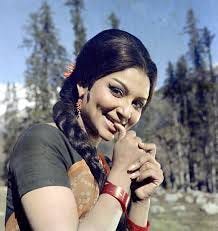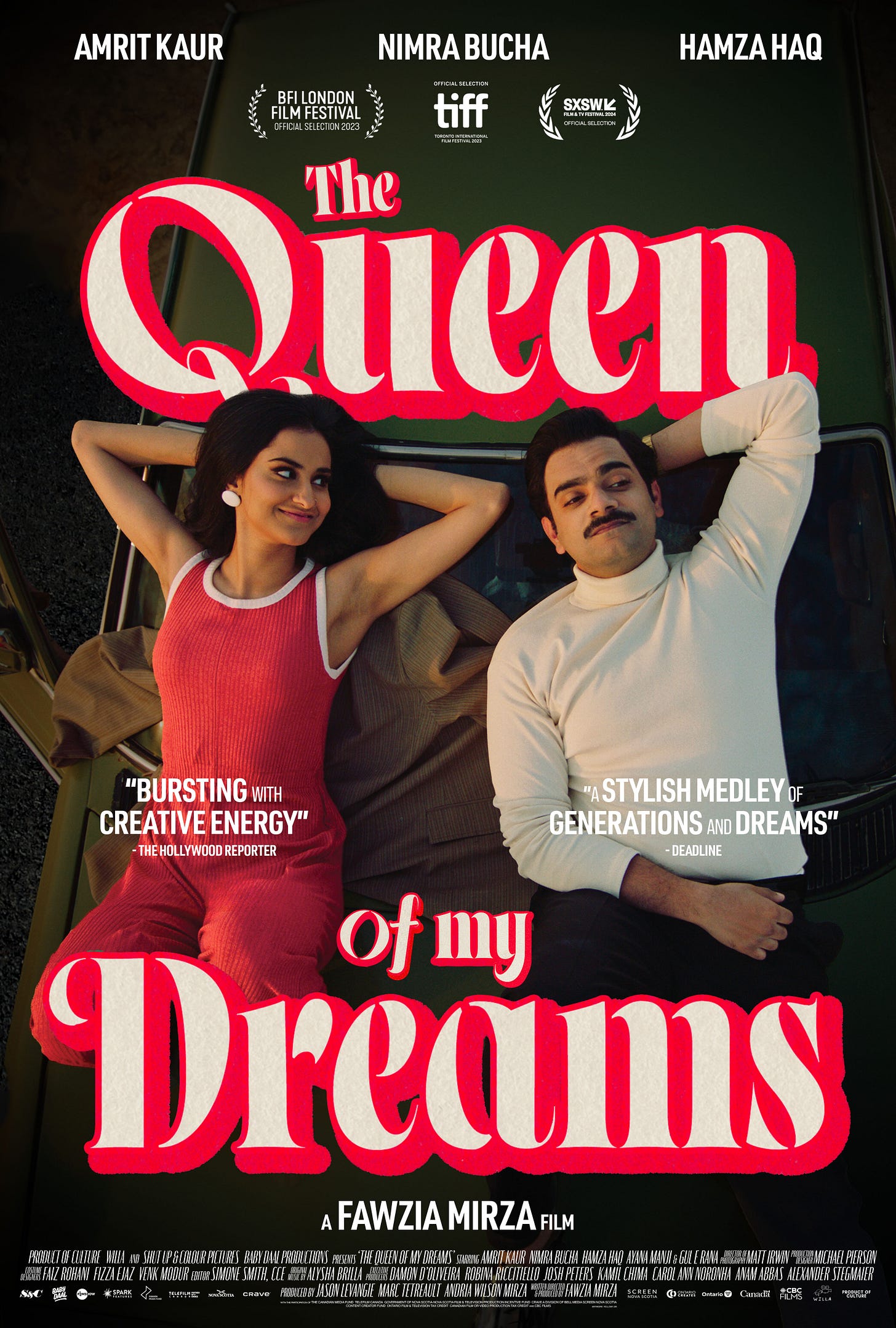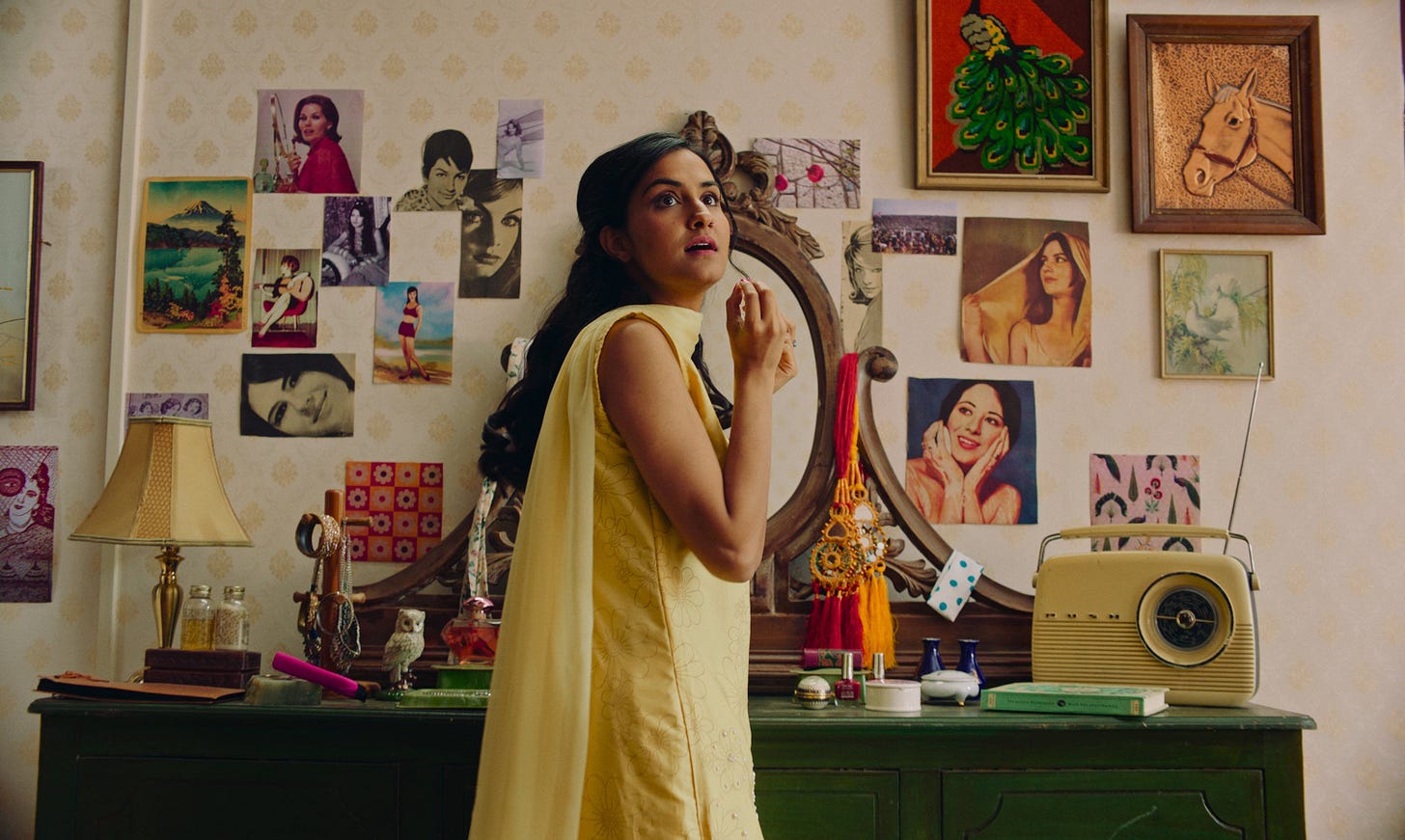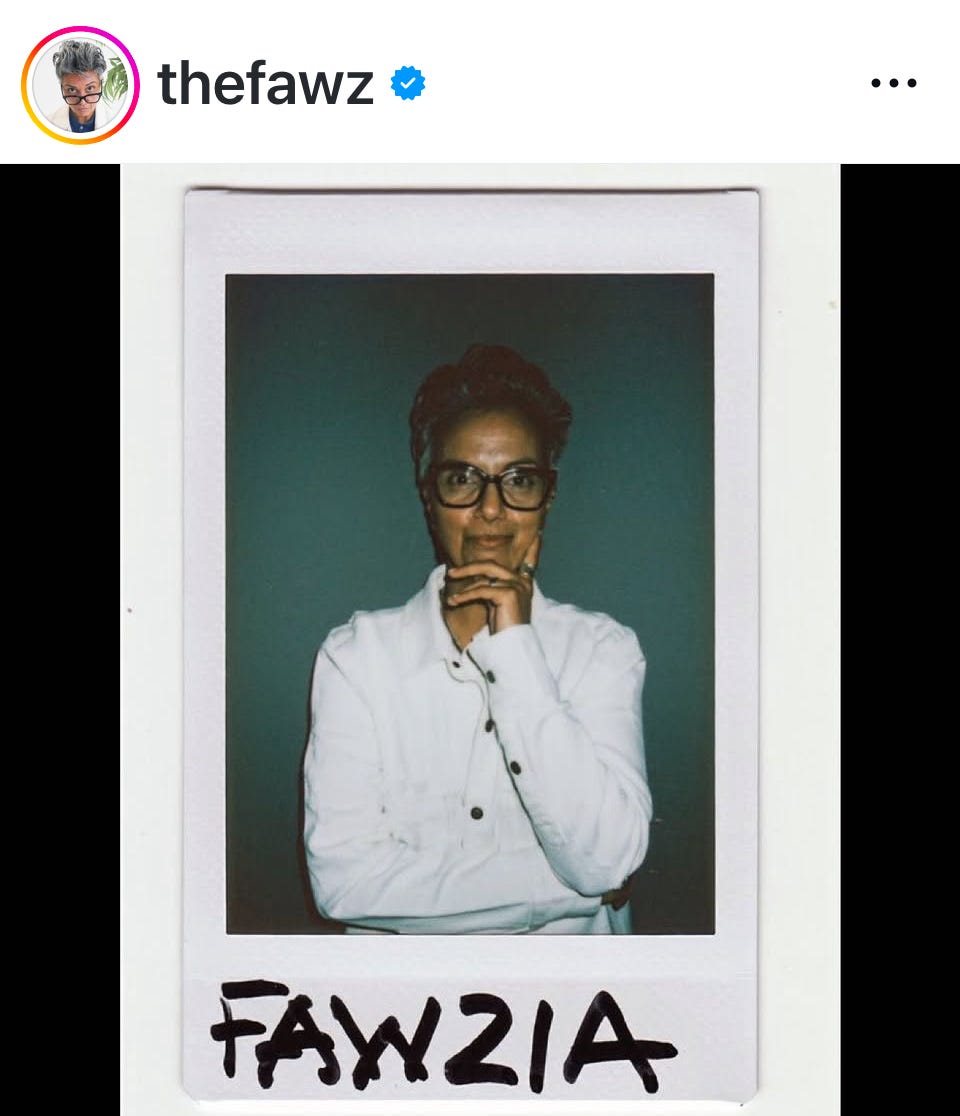Asian A.V. Club newsletter #50: Fawzia Mirza
Writer, Director Fawzia Mirza takes us into the world of her award winning Bollywood-inspired comedy drama The Queen of my Dreams.
Filmmaker Fawzia Mirza is a queer writer and director whose debut The Queen of My Dreams world premiered at the Toronto International Film Festival, made waves at SXSW, won a few awards and is now finally coming to our screens. Her journey as a filmmaker began as a short about her South Asian queer identity, then morphed into a one-woman show diving into her complicated relationship with her mother and her deep love for Bollywood legend Sharmila Tagore. That evolution has now led to her vibrant feature debut, The Queen of My Dreams, starring Amrit Kaur (The Sex Lives of College Girls) as a daughter who heads back to Pakistan after her father’s sudden death, and ends up on a journey through memory, culture, and identity, with plenty of lush flashbacks and family drama along the way.
As instant fans of the film, we managed to speak to Mirza before the wonderful announcement that she’ll be directing the upcoming movie adaptation of the popular novel Hana Khan Carries On, produced by Mindy Kaling.
Asian A.V. Club: We are big fans of hearing an origin story, but during my research I read that you were a lawyer before moving into films, sorry for jumping the gun, but you gotta tell me how you segued into it!
Fawzia Mirza: (laughs) It’s true. I didn't go to film school or theater school, I actually went to law school. I loved the arts, though. I acted in plays, did speech team, and was in the band in high school. But when it came time to go to college, my Asian parents said it was time to do something serious with my life. So, I got an English degree and then went to law school, because it was like, either get married or get your education. I chose education. I passed the bar exam, much to my surprise, but by then I had already decided I wanted to pursue acting.
In my last year of law school, I took a mandatory class called trial advocacy, where you learn the rules of evidence; objections, cross examinations, opening arguments. It reminded me so much of performing. The professor of that class also coached the trial team and encouraged me to try out. I did, and I loved it. That experience prompted me to take an acting class in Chicago while finishing law school. I loved it so much and got enough positive affirmation from my teacher that I thought, I’m going to be an actor. So, I took the bar exam and told myself, great, now I’m going to act.
As you might expect, nothing happens overnight where suddenly you’re swimming in money that pays the bills. So, I went back to my most marketable skill and got a job at a law firm in Chicago as a civil defense litigator. I was lawyering by day and acting by night, taking improv classes, doing theater, meeting amazing people. I got into the theater scene and got my first stage role as Cobweb in A Midsummer Night’s Dream. Cobweb doesn’t have a lot of lines, one of them is literally saying Cobweb’s name, but I was so excited because I was like, I have made it!
Asian A.V. Club: What happened after Cobweb?
Fawzia Mirza: I kept performing for about three years and then left the law completely. I joined a company called Catharsis Productions, which at the time was doing a show called Sex Signals. It was a funny, educational show centered around the really serious topic of date rape prevention. That job became a defining part of my creative life. The training I got and the people I worked with helped shape the kind of comedy I wanted to write and put out there in the world. Instead of making jokes at the expense of marginalized people, I learned the value of comedy that doesn’t punch down.
We toured the show to colleges across the country and later to military installations around the world. I saw firsthand the power of comedy to connect with all kinds of people and audiences. It was so remarkable and deeply influenced my drive, my mission, and ultimately my purpose as a creative.
Then in 2012, I made my first short film. It was a very public conversation about a very private struggle, whether I could be queer and Muslim and love Bollywood romance all at once. With the help of my friend Ryan Logan, who helped shape what started as an art piece into a film, I shared that story. Making it truly saved my life. That was the beginning of my journey into the world of film festivals and independent filmmaking. I kept acting and writing, made more shorts and web series, and eventually created a one-person show inspired by that film.
That work led to my first feature, Signature Move, a Pakistani Muslim lesbian wrestling rom-com. Probably still the only one of its kind. (laughs) We world premiered at South by Southwest in 2017, and the film went on to travel the world. It was only after that experience that I started to believe a feature like The Queen of My Dreams could actually be possible.
Asian A.V. Club: The journey for The Queen of My Dreams went from the short to your one-person stage show Me, My Mom & Sharmila before blossoming into a full-fledged feature. Was there always a plan to keep expanding your story?
Fawzia Mirza: I did this short because I was an actor and then I made it into a one-person show because I always dreamt of going to the Edinburgh Fringe. But it wasn't until after I started making other work and seeing that I could write movies or screenplays that I started to dream of this being a movie.
But I will say that if you know me, you know that I get obsessed, and I focus on a project, and don't want to let go of that project. With this project I'd say that it wasn't done because I wasn't done. It’s been part of my journey since 2012, really homing in on who I am, being able to share the power of joy and love and the importance of queer Muslim storytelling. The kind of positive storytelling where we see ourselves not just survive but thrive.
If you look at the short, it was deeply like, who am I? The one-person play is very much, what happened to my mother? Why did she change? And the movie is, we need to step out of the intergenerational trauma, no matter what, and not make the same mistakes as those who came before us. And there's room for us to have compassion for our mothers and our grandmothers. And if we can step out of that trauma, we can move forward with that aspirational love and joy and healing that we all deserve.
Asian A.V. Club: I have to say that the version of Pakistan that I see in your film is very different from the images that I feel we have been bombarded with. How important was it to show a different side of this country and to even shoot it in Karachi?
Fawzia Mirza: I think the first source for me, like, the thing that really shifted something, was seeing Pakistan differently than how it's typically depicted in the news. The news is probably the biggest culprit, more than movies or TV shows about terrorism. I’ve been to Pakistan many times, probably 13 to 15 times by now. Growing up, I spent my summers there. So, I know the country in a very personal way. It’s a wild city full of adventure, and that lived experience has been a big inspiration.
Another source was my family. I've seen so many photos of my mother, my father, cousins, uncles. Their lives in these photos were so vibrant and robust and beautiful, whether it was the fashion, the poses, or the stories behind them. There was so much richness to draw from.
And then there’s my mom specifically. I knew the stories of her being this cool, independent woman growing up in post-colonial, partitioned Pakistan. She went to an all-girls convent school and her teachers were half nuns. That’s a common story in formerly colonized countries, but it feels like we’ve forgotten that world.




Also, when you talk to elders, not just in Pakistan, but around the world, you hear about this golden era. I’ve always wanted to make a docuseries called 1969 that explores this golden era and moment in different cities around the world like Karachi, Beirut, Cairo. Some elders talk about that time with love; others don’t, especially those who lost their homes or memories during partition. Many avoid talking about it because the country has changed so much.
But I’d never seen 1969 Karachi on screen, because what are we doing with our art if not trying to love, impact, and heal through it? Imagining that version of Karachi gave me a sense of hope and joy. It allowed me to show the world a different lens of who we are. The 60s vibe wasn’t just in London or the U.S. That’s a bubble we live in now, and I wanted to break out of that. That’s also why it was so important to actually film there.
Asian A.V. Club: In your film, the lead character Azra (Amrit Kaur) manages to not only understand the intergenerational trauma but reconciles in her own way with her grandmother and mother. I’m curious, what was it like to present this film to your family, especially to your mother who inspired so much of the story?
Fawzia Mirza: Not all of my immediate family has seen it. Some have, and I think the thing that is true about human beings is that we're always looking for ourselves reflected in the work. I've definitely had cousins who have seen themselves or their family reflected in the film, and that's really beautiful.
With my mother, she hasn't seen it, and I don't know if she will. I think one of the big life lessons that I learned from this whole experience is that you have to love without attachment to outcome. Because if you're only seeking outcome, you may never be getting what you want or need or deserve. If you only love to get something in return, that's when it might hurt you the deepest. So, I made this film and put it out in the world detached from outcome as to whether she would or would not watch it. But who knows, we're having our US theatrical this week and it's almost the beginning of this movies journey. So maybe there's so much more story yet to unravel about what happens. You know what I'm saying?
Asian A.V. Club: I have a feeling that there is more story to come from all of this. I have one final question that I had to ask, did you ever play a lawyer as an actor?
Fawzia Mirza: (laughs) You know what? In Signature Move, I wrote the character as a lawyer, but that lawyer didn't get to be in a courtroom. I'm not really acting right now, but… for the right role, for the right person, I would do it! But what I really want to do is direct on a law show. I want to direct in a courtroom because it's the world where I come from.
Asian A.V. Club: I feel like I’m helping you manifest! I can't wait to see everything you're working on next.
Fawzia Mirza: Thank you!













Great interview and I need to check out more of her work!